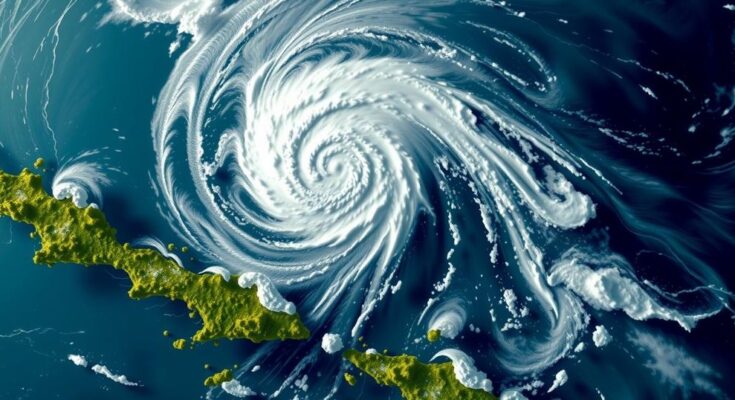Tropical Storm Oscar, after making landfall in Cuba as a Category 1 hurricane, moved toward the Bahamas, leading to at least six fatalities and significant rainfall. With predictions of possible flooding in the Bahamas, Oscar is recognized as the smallest recorded hurricane. Concurrently, NOAA has anticipated a busy hurricane season due to warm ocean temperatures.
On Tuesday, October 30, Tropical Storm Oscar continued its trajectory toward the Bahamas after impacting Cuba as a Category 1 hurricane. The storm claimed the lives of at least six individuals while delivering significant rainfall to Cuba, which was concurrently experiencing a widespread power outage from an unrelated incident. By Tuesday morning, Oscar was reported to be situated approximately 45 miles (75 kilometers) south-southeast of Long Island in the Bahamas, exhibiting wind speeds of 40 mph (65 kph) and advancing north-northeast at a pace of 12 mph (19 kph), as recorded by the National Hurricane Center in Miami. As defined by meteorological parameters, the National Hurricane Center stated, “Oscar is at best barely a tropical storm at this time.” However, there are anticipations that Oscar could produce rainfall amounts reaching up to 5 inches (13 centimeters) across the southeastern Bahamas, with isolated areas possibly receiving up to 8 inches (20 centimeters). Consequently, a tropical storm warning was issued for the central and southeastern Bahamas. Notably, Oscar has been classified as the smallest hurricane on record, possessing a wind field that measured a mere 6 miles (10 kilometers) in diameter. This unprecedented shrinkage in size gained attention, especially as it made landfall in the Bahamas on Grand Inagua Island and subsequently in eastern Cuba. Michael Lowry, a hurricane specialist and storm surge expert, highlighted an unusual lapse in forecasting, stating, “It’s not often we see a colossal failure in hurricane forecasting,” as no predictive models had indicated the potential for Oscar to strengthen into hurricane status. During its course, Oscar unleashed at least 15 inches (38 centimeters) of rain in certain regions of eastern Cuba on Monday, raising alarms concerning severe flooding and the risk of landslides. The fatalities were confirmed in Guantánamo province, underscoring the storm’s destructive impact on the region which was already grappling with a significant blackout resulting in public demonstrations against the government. Oscar has become the 15th named storm and the 10th hurricane in the current Atlantic hurricane season, which commenced on June 1 and will conclude on November 30. The National Oceanic and Atmospheric Administration (NOAA) had previously forecast an above-average hurricane season for 2023 due to unprecedented warm ocean temperatures, estimating between 17 to 25 named storms and projecting four to seven major hurricanes of Category 3 or higher. Simultaneously, Tropical Storm Kristy was observed spinning over the Pacific Ocean, situated 375 miles (605 kilometers) west-southwest of Acapulco, Mexico, with maximum sustained winds of 50 mph (85 kph) and moving west-northwest at a speed of 15 mph (24 kph). Expectations were set for Kristy to reach hurricane status by Tuesday evening.
The article discusses the trajectory and impact of Tropical Storm Oscar, which struck Cuba and is moving toward the Bahamas. Oscar is noted for its historical significance as the smallest recorded hurricane, as well as its interactions with existing weather patterns, including heavy rainfall resulting from its path. The article also highlights the implications of the storm on local populations, particularly in Cuba, and the ongoing ramifications of a separate power outage crisis in the region. This event is set against the broader context of the Atlantic hurricane season, which is predicted to be more active than usual this year.
Tropical Storm Oscar has demonstrated significant destructive capabilities, resulting in fatalities and severe rainfall across Cuba and impending impacts on the Bahamas. The notable classification of Oscar as the smallest hurricane on record raises discussions regarding meteorological forecasting accuracy. As the Atlantic hurricane season progresses, the likelihood of additional storms remains high, reinforcing the need for preparedness in affected regions.
Original Source: www.seattletimes.com




